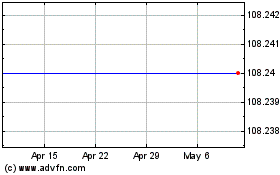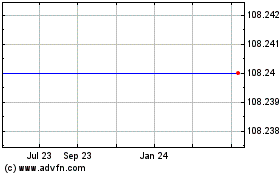Bristol-Myers Prepares Large Bond Sale To Fund Celgene Purchase
May 07 2019 - 10:22AM
Dow Jones News
By Sam Goldfarb
Bristol-Myers Squibb Co. is planning to sell around $20 billion
of bonds on Tuesday, seizing on a low-interest rate environment to
help fund its blockbuster acquisition of Celgene Corp.
Coming off solid first-quarter earnings, Bristol-Myers is aiming
to sell nine different bonds, with maturities ranging from
one-and-1/2 years to 30 years, investors said. If it meets
expectations, the bond sale would be the biggest of the year and
the largest since Comcast Corp. sold $27 billion of bonds in
October to finance its purchase of Sky PLC, according to
Dealogic.
As with many other companies that have executed bond sales of at
least $10 billion in recent years, Bristol should have little
trouble placing its debt, investors and analysts said.
When the pharmaceutical company first announced a deal to buy
rival Celgene for roughly $74 billion in early January, demand for
corporate debt was soft, leading to higher potential borrowing
costs for companies. Since then, however, Treasury yields have
fallen and investors have demanded a smaller amount of extra yield,
or spread, to hold corporate bonds over government debt.
Bristol-Myers, historically a conservative borrower, is wagering
that acquiring Celgene will expand its pipeline of drugs and give
it more leverage in negotiations with insurance companies and
pharmacy-benefit managers that determine reimbursement and
coverage.
In a filing last week, Bristol-Myers estimated it would borrow a
total of $29 billion to fund the Celgene deal, which is expected to
close in the third quarter. It has already obtained $8 billion of
loans from banks.
Analysts at the research firm CreditSights have projected that
Bristol-Myers's ratio of debt to earnings before interest, taxes,
depreciation and amortization, or Ebitda, would rise to 3.2 times
from 0.7 times after the acquisition. They also estimate the
company will be able to generate $14 billion to $16 billion of
annual free cash flow over the next three years, allowing it to cut
its debt-to-Ebitda ratio roughly in half over that span.
Even with the increase in debt, Moody's Investors Service
indicated last week that it will likely downgrade Bristol-Myers'
credit rating only one notch to A3 from A2. That sets the company
apart from many other investment-grade companies that have settled
into the bottom rung of the investment-grade credit ladder, a trend
that has raised concerns about massive downgrades to junk territory
if there's an economic downturn.
Both Bristol-Myers and Celgene have had their challenges in
recent years. Bristol-Myers has lost its advantage in immunotherapy
treatment of lung cancer to rival Merck & Co., while Celgene
has struggled to find new products to offset the looming patent
expiration of its top-selling cancer drug Revlimid.
Still, Bristol-Myers last month reported higher-than-expected
revenue in the first quarter, helped by stronger demand for its
immunotherapy drug Opdivo and blood-thinner Eliquis.
Bristol-Myers' bond sale will boost the 2019 tally of
investment-grade bond issuance, which has matched last year's pace
but fallen below the record-setting standards of other recent
years.
Write to Sam Goldfarb at sam.goldfarb@wsj.com
(END) Dow Jones Newswires
May 07, 2019 11:07 ET (15:07 GMT)
Copyright (c) 2019 Dow Jones & Company, Inc.
Celgene (NASDAQ:CELG)
Historical Stock Chart
From Mar 2024 to Apr 2024

Celgene (NASDAQ:CELG)
Historical Stock Chart
From Apr 2023 to Apr 2024
